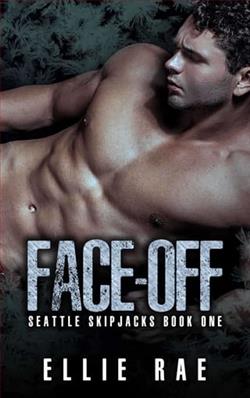Page 5 of Unraveling Charlotte
Tatum raises an incredulous eyebrow. “Why are you still friends with her?” It’s a question she’s asked countless times. “Honestly, Milo could hang out here. He’s a sweetheart, and the regulars adore him.” She has a point. Milo is well-mannered, bright, and endears himself to everyone he meets.
“He might need to tomorrow night,” I admit. While Milo doesn’t mind spending time at the diner, it’s not exactly a child friendly environment for extended periods.
“No worries, I’ll stop by and keep an eye on him,” Tatum offers, catching me off guard. Her maternal instincts aren’t usually at the forefront, making her offer both surprising and appreciated.
“You’d really do that?” I’m genuinely touched by her willingness.
“Yeah, I’ll even bring snacks and coloring books. Now, off you go. See you tomorrow night.” With a playful swat to my backside, she ushers me out of the backdoor.
“I’m going, I’m going.” I pull my beanie over my head and push the door open. “Oh and, Tate? Thanks.”
She responds with her characteristic bombastic eye roll, a gesture that speaks volumes more than words ever could.
As I step outside, a gust of wind greets me, and I instinctively tighten my scarf. The air carries the hint of snow, and I hope it holds off until tomorrow. Milo’s only wish is to visit the history museum and have me officially recognized as his guardian. Today, I finally get to fulfill that wish.
Two
A hushed tranquility embraces me,accompanied by the soft afternoon glow of a chilly autumn day filtering through the canopy of pine trees. Each exhale forms a delicate puff of misty air, a visible testament to the crispness of the atmosphere. The sun radiates its golden light, yet despite its appearance, the chill has entrenched itself within my bones, a cold presence that only a hot shower and a glass of wine can dissolve.
That chill triggers a surge of memories from a fateful night a few years ago. It courses through my mind and almost causes me to stumble over my feet. Cold and snowy, it was a night with the worst conditions imaginable, one that left a lasting mark.
It was the night that irreversibly altered the trajectory of my and my brother’s lives. It robbed us of everyone we held dear, forcing us into an unexpected closeness that fate never intended.
After our parents’ tragic passing, I needed an anchor, something to divert my mind from the pain of their absence, so intending to drive to Canada, we made a game of stopping at all the diners, drive-ins, and dives, just like one of my favorite shows. We landed here after a while. Lenora might not be the tiniest of towns, its population exceeding my initial preferences. Still, something about it resonated deeply when Milo and I strolled down Main Street. The town exuded a serene quality I yearned for and one that Milo deserved.
The schools boasted a low student-to-teacher ratio, and come Friday nights, the whole town gathered for football games, but of all the days, Sunday remains my favorite.
As my footsteps echo along the sidewalk, the tempting aroma of food trucks drifts toward me. In my mind’s eye, I can already see the alleyway, with a long stretch of red brick wall on my right, where they are all parked. Milo would be urging me in that direction on any other Sunday after my shift, but today is different.
Turning left, I traverse the quiet street and pull my coat snug around me. Towering old trees loom above, their leaves stubbornly clinging to the remnants of fall. Shades of orange, red, and brown carpet the pavement, while across the street at the park, a kaleidoscope of colored leaves dances in the crisp breeze.
I give a final, reassuring pat on my pocket for luck as I veer onto our narrow street. Rows of homes stand tall, and residents sit on their porches, exchanging smiles and greetings with passersby.
It’s perfect. Today is perfect.
Walnut Street stretches before me, a far cry from the dense city where we once lived in cramped row houses. The owners care for and love these homes, unlike the dwellings that used to shelter drug dealers and addicts.
Our home is to the right, just a short stroll from the diner. It’s a cozy abode with yellow siding adorned by royal blue accents. Our landlord, Mr. Benson, usually occupies the adjacent home, relaxing outside. However, he’s not there today—probably enjoying lunch at the food trucks.
Jani, on the other hand, is outside.
While Mr. Benson’s home graces the right side of the street, Jani’s resides on the left. The fourth house, which is opposite hers, remains vacant, forming our quaint row of homes.
I look first at her hair—a cascade of long, curly, frizzy light brown locks that seem to have a life of their own. Her warm smile greets me, followed by her laughter that reaches my ears with a cheerful resonance. It echoes down the street, bouncing off the walls of our shared alley.
I’ll never voice the suspicion that her laughter seems forced and strained, as if she’s compelled to fill every silence with sound. When she’s not speaking, she’s laughing.
“Jani.” I greet my neighbor with a smile, hoping to convey sincerity. “Where’s Milo?” A momentary jolt of anxiety courses through me, igniting every nerve and vessel. The reason behind my reaction is clear—an indelible scar from the day I arrived home only to have social services take him away, a lingering result of the day Jani let them in. It’s a wound that may never fully mend.
“Inside. I need to drop Simon off at his dad’s, so I’m grateful you’re here.” Simon, her son, is just two years older than Milo. Despite our different stories, we forged our initial connection over the shared experience of raising young boys on our own.
Jani went through a divorce and now juggles joint custody.
Milo and I are orphans, relying solely on each other.
We may come from different backgrounds, but we’re both navigating the path of raising our beloved boys.
“Thanks for looking after him this morning.” I step onto my petite porch and face Jani. She’s clad in her typical ensemble—sweats and a cropped shirt—but somehow, she manages to make even that look good. Despite the chilly twenty-degree weather, she’s dressed as if it were summer.















